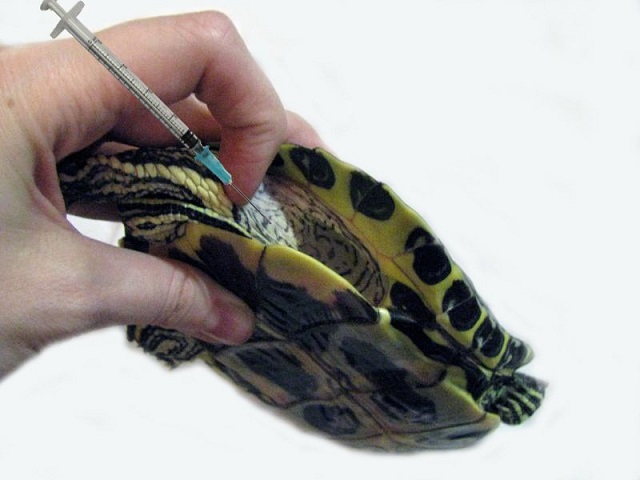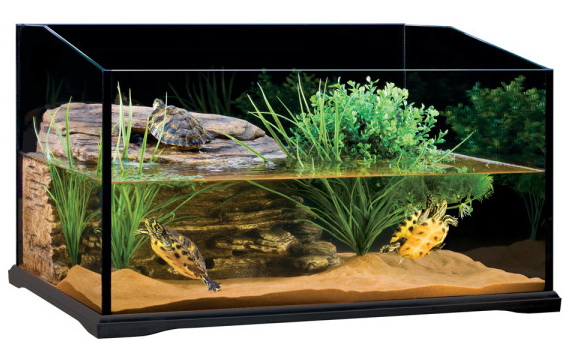
И наземные, и водные виды черепах подвержены заболеваниям дыхательных путей, иначе говоря, у них может случиться то, что мы называем «простудой». Они не встречаются с другими черепахами, следовательно, не могут заразиться – почему же это происходит, и как можно им помочь?
Как простужается черепаха?
Наиболее распространенная причина заболевания дыхательных путей у черепах – действительно простуда, т.е. слишком прохладная температура в террариуме. Это может произойти из-за сквозняка, холодного вечера, перевозки черепахи в прохладное время года, из-за перегоревшей лампы в террариуме и т.д. Если в террариуме содержится несколько черепах, одна из них вполне может заразить соседей.
Каковы признаки дыхательного заболевания у черепах?
Чаще всего заболевание можно заподозрить по таким симптомам, как затрудненное дыхание, вялость, потеря аппетита. Часто у водных черепах возникают проблемы с балансом, они не могут нырнуть. Рептилии могут дышать с открытым ртом, с присвистом. Изо рта, носа и глаз могут появиться выделения. 
Серьезно ли это?
Да! Простуда или респираторная инфекция может перейти в пневмонию. Если черепаха не ест в течение продолжительного времени, это очень плохой признак.
Что нужно делать, если у черепахи простуда?
В первую очередь необходимо проверить температуру воздуха в террариуме. Чаще всего оказывается, что ночью в жилище черепахи слишком холодно, или же в точке обогрева недостаточно жарко. Подумайте: какие изменения произошли в жизни черепахи в последнее время? Она путешествовала? Вы передвигали террариум? Были ли резкие падения температуры в доме? Может быть, были перебои с электричеством? Если не работает лампа обогрева, или по каким-то другим причинам температура в террариуме ниже нормы, немедленно это исправьте. Иногда повышение температуры производит самое благоприятное действие на черепаху. Увеличение уровня влажности в террариуме также облегчит состояние вашего питомца (подобно тому, как увлажнители воздуха помогают людям с простудными заболеваниями). Ни в коем случае не давайте черепахе никаких лекарств без указания ветеринара!
Следующий шаг - запишитесь на прием к ветеринару. Скорее всего, черепахе потребуются антибиотики для борьбы с болезнью. Возможно, врач возьмет отделяемое на посев, или сделает рентген, чтобы исключить или подтвердить пневмонию.
Что можно сделать, чтобы предотвратить простуду?
 Постоянно контролируйте температуру в террариуме. Для этого недостаточно просто измерить ее в середине террариума в одно и то же время суток – необходимо знать, какая температура держится в разных углах жилища черепахи в разное время дня. Вы можете обнаружить, что ночью в террариуме слишком холодно, или же от сквозняка в нем образуются прохладные зоны. Исправьте эти недостатки и держите черепаху в тепле даже во время ее прогулок вне террариума - и тогда простуде неоткуда будет взяться!
Постоянно контролируйте температуру в террариуме. Для этого недостаточно просто измерить ее в середине террариума в одно и то же время суток – необходимо знать, какая температура держится в разных углах жилища черепахи в разное время дня. Вы можете обнаружить, что ночью в террариуме слишком холодно, или же от сквозняка в нем образуются прохладные зоны. Исправьте эти недостатки и держите черепаху в тепле даже во время ее прогулок вне террариума - и тогда простуде неоткуда будет взяться!
Чтобы оставить здесь комментарий, войдите или зарегистрируйтесь на сайте.
Авторизация